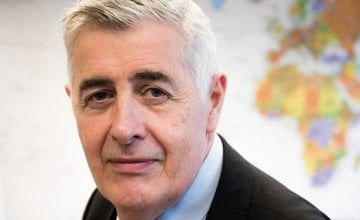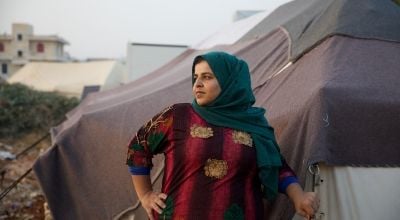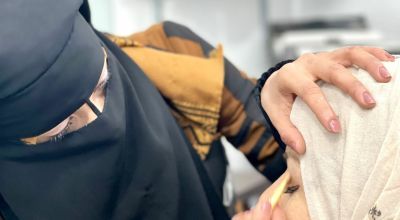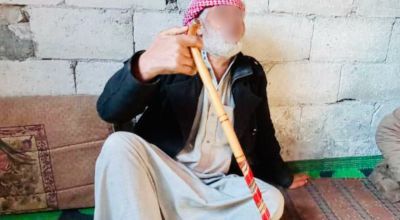
Read our 2023 annual report

Knowledge Hub
Empowering women plays a key role in Syria humanitarian response

As Ireland continues it's journey to full gender equality, Concern CEO Dominic MacSorley says it is vitally important that we show solidarity with people who are furthest behind around the world — especially Syria.
Eight years of war
The war in Syria has now entered its ninth year. What began as a response to peaceful protest in 2011, quickly erupted into a ferocious conflict that has since led to the deaths of more than half a million people, driven an exodus of over 6.5 million refugees, almost half of whom are children, and displaced millions more within the country. In 2018 alone, 1,106 children were killed in the fighting – the highest ever number of children killed in a single year since the start of the war.
In Ireland, the war may have faded from the headlines amid the ceaseless cacophony of Brexit, but it rages on. While the vast majority of Syrian refugees want to return to their homeland, there are serious concerns for the safety of those who attempt to do so. Caught between a country they cannot safely return to and life in exile, many Syrian refugees live a life of prolonged struggle – the impact of conflict and displacement compounded by increasing levels of poverty and despair.
Today, at the 63rd Commission on the Status of Women in New York, Geraldine Byrne Nason, Ireland’s Ambassador to the United Nations and current Chair of the Commission, will launch a report on gender based violence (GBV) and the experience of Syrian women who have become refugees in Lebanon.
Violence against women
We know that conflict and displacement leads to an intensification of violence directed against women and girls, and the extent of gender based violence caused by the Syrian conflict is inestimable. A report published by the Irish Consortium on Gender Based Violence, ‘In violence we forget who we were’, examines how responses to GBV can be effectively incorporated into the large-scale humanitarian response.
Lebanon, a country the size of Munster, but with a population size similar to Ireland, is now hosting an estimated 1.5 million Syrian refugees and the country’s humanitarian response plan to respond to the Syrian crisis is immense.
However, the report shows that even within a very daunting context such as the Syrian crisis, when you prioritise responding to GBV, you can greatly help those who have experienced terrible trauma.
Holistic, well-resourced programmes can enable women and girls to regain their confidence and achieve a level of empowerment that they may have never thought possible."
Restoring that agency and ensuring that GBV response programmes are survivor-led is essential, as is having a sustained presence on the ground along with adequate resources and funding.
'No choice'
I recall speaking to a 15-year-old Syrian girl the last time I visited Lebanon.
Living with her mother and younger sister in a rented room in a garage, she felt she had no choice but to give up her dream of becoming a doctor to marry a 50-year-old man, so she would no longer be a burden on her family.
Not only had she survived the hardship of war in her country and become a refugee, she was about to destroy her future, like so many other girls have been forced to. Fortunately, Concern was able to step in, to support her family to pay the rent and the young girl is now back in school. You see there are always solutions.
We know there is no substitute for peace in Syria, but there is also no excuse for inaction, or worse, apathy. There is every reason and indeed a moral responsibility to make circumstances better, to provide families, especially women and girls, with positive options and choices.
One of the most encouraging findings that our report shows is that the humanitarian response to the Syrian crisis has changed the reality for women of all backgrounds in Lebanon, from refugee and host communities alike. Even in times of crisis, it is possible to have an extraordinary impact on the lives of the most vulnerable.
That crucial realisation has been central to the work of Concern, that we can affect transformative change alongside providing life-saving assistance.
Conflict far from over
It is welcome and so vital that this belief is at the heart of Ireland‘s new policy on international overseas assistance. The ambition to ‘reach the furthest behind first’, which frames Ireland’s new overseas assistance outlook, is not only an acknowledgement of our obligations to support the most vulnerable people on earth, but a crucial affirmation of our ability to do so. From a humanitarian perspective, it is a very welcome boost at a time when regression and isolationism is plaguing many nations in Europe.
The resilience of Syrian women in Lebanon is truly inspiring, but the long nightmare of the conflict is far from over. With this report we want to show how survivor centred programming is helping to rebuild the lives of women and girls and contributing to the promise of a future beyond the war."
As Ireland continues on a hard fought but inspiring journey towards gender equality, it is crucial that we also show solidarity with those who are furthest behind. If we are committed to the empowerment of women and girls across the globe, then we must continue to support this vital work on the ground.
Dominic MacSorley is Chairperson of the Irish Consortium on Gender Based Violence, and Chief Executive Officer of Concern Worldwide. The Consortium’s report, ‘In Violence we forget who we were’, can be read at www.gbv.ie.





